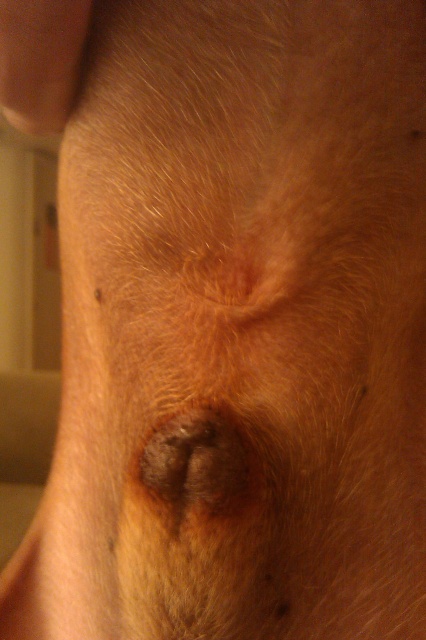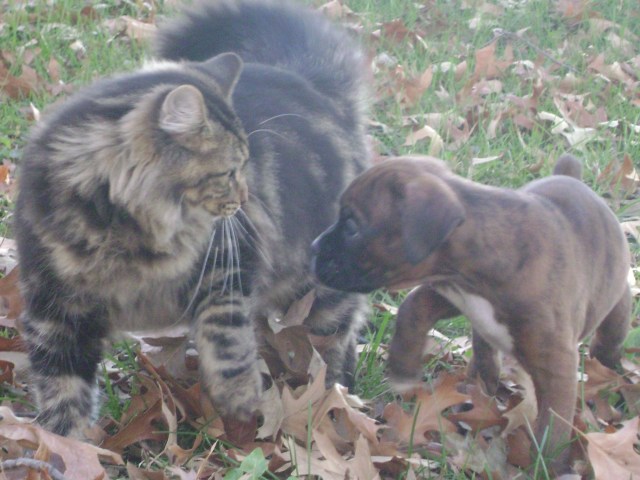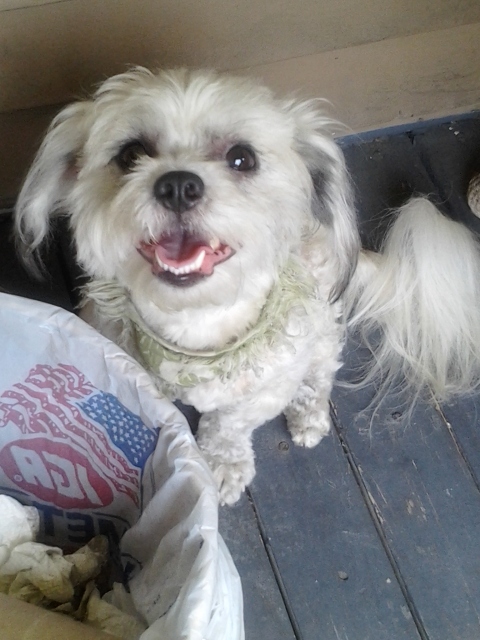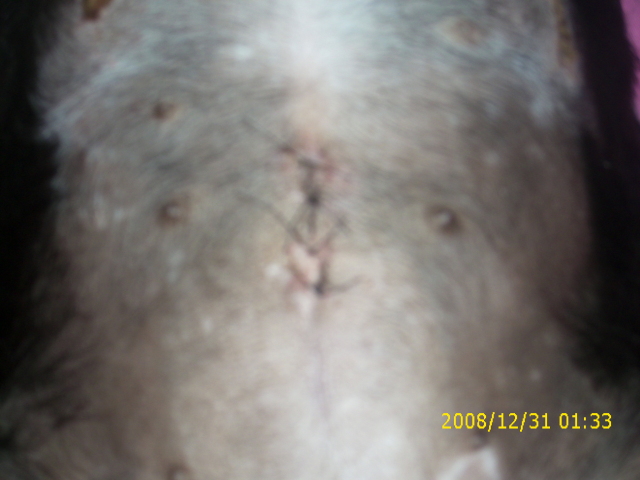QuestionMy boyfriend and I brought home a boxer pup at 7.5 weeks old (he is now 9.5 weeks old). He lives with us in our apartment, but he will be spending some time at my parent's house, as well. I go over there quite often and do not want to leave Bruiser alone in the apartment because he obviously needs a lot of care for his current "puppy schedule" (a lot of bathroom breaks, feeding 4x daily, playtime to help release energy).
My parents have 2 dogs (Peanut, a small yorkie appx. 6 years old and Oliver, a border collie/lab mix appx. 4 years old). Oliver has always had social issues with people and dogs (we believe it was because his foster home didn't treat him very well). His social issues with people have gotten better thanks to training, but he is VERY unpredictable and often aggressive towards other dogs (excluding Peanut). Peanut is very territorial, although mostly good with other dogs (it takes some warming up, sometimes).
I've tried introducing Bruiser to Peanut and Oliver already (on their territory). Oliver was very aggressive toward Bruiser (growling, showing teeth), and I couldn't bring Bruiser close enough because I was afraid Oliver might snap at him. His energy level and playstyle (a lot of jumping), also make Oliver more anxious. Peanut was better with Bruiser, but acted cold and aloof. Bruiser's playstyle is also too much for Peanut because he only weighs 5 pounds and Bruiser is at 12 pounds (which is mostly muscle).
How can I get Peanut and Oliver to accept our boxer pup? Oliver needs to stop his aggressive behavior towards Bruiser and realize that his jumping and playing are not meant to be threatening. Peanut (as resident oldest dog) needs to learn that Bruiser is not meant to replace him, while Bruiser needs to learn that Peanut is fragile and he needs to approach him with less energy. I want Bruiser to learn proper socialization skills, and am afraid that Peanut and Oliver will instill fear in him.
AnswerAt this time, I think it's best that Oliver not be allowed to interact with Bruiser at all because he could easily injure or even kill Bruiser. Peanut's attitude is fine, because he's letting Bruiser know that he's in charge. Once they've established rank, then Peanut may 'warm up' some and play a little with Bruiser. Then again, he might not. Do not try to force them to be together or play. Just being around each other is good for socialization. When you take Bruiser over to your parents' house, have them block Oliver's access to the room you, Bruiser, and Peanut are in with a baby gate, or put him in a crate so he can observe, but not actually interact. He may eventually get used to Bruiser enough to allow them to be together supervised, and he may not. What if your parents brought Peanut to your house for short periods of time and left Oliver at home? Oliver may be happy to NOT have to be around Bruiser.
Many times, walking dogs together will help them to get used to each other, but Bruiser is much too young to be walked in public yet. He should have had his first puppy shot at 9 weeks of age, and his next two should be at 12 and then 16 weeks of age, and if this is the case, he will not be fully immune until 18 weeks of age. That means that he should not be walked in public or taken to places where other dogs may have been until 2 weeks after his 3rd puppy shot (or at 4.5 months of age), because he could contract a potentially deadly disease such as distemper or parvo. If he has not had his first puppy shot yet, he should get it ASAP. The 2nd shot should be given 3 weeks after the first shot, and the 3rd shot should be given 4 weeks after the second shot. The first rabies vaccination can be given anytime after the 3rd shot. I don't recommend doing the rabies vaccine AND the 3rd puppy shot together because that can actually suppress the immune system.
Have you considered enrolling Bruiser in a puppy class? That would be another thought to consider.

 Found Dog
Question
this is what it looks
Hello my is sara and my
Found Dog
Question
this is what it looks
Hello my is sara and my
 Puppy wont come
Question
Capone & Rascal
Help! My seven week
Puppy wont come
Question
Capone & Rascal
Help! My seven week
 My shitzu/bision (is on facebook)
Question
Barkley
Barkley Layberger ,my dear 2 ye
My shitzu/bision (is on facebook)
Question
Barkley
Barkley Layberger ,my dear 2 ye
 I want to know how to remove my dogs spay stitches and the right way.
Question
this is the area that
I need to know how to r
I want to know how to remove my dogs spay stitches and the right way.
Question
this is the area that
I need to know how to r
 Nutrition & Health
Question
Peek-A-Boo!
Hello! I am new to owning small br
Nutrition & Health
Question
Peek-A-Boo!
Hello! I am new to owning small br